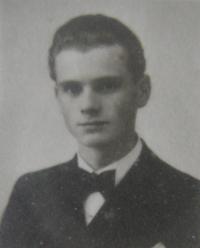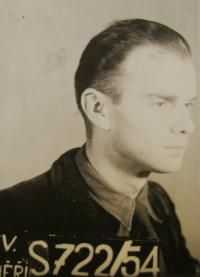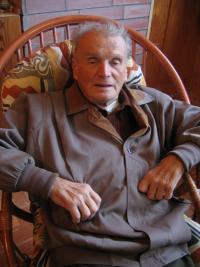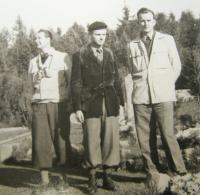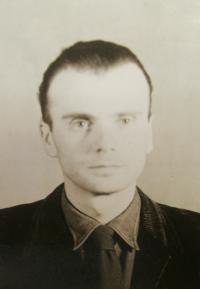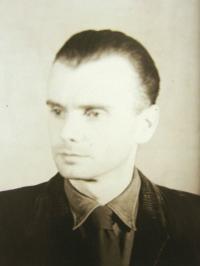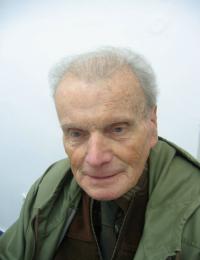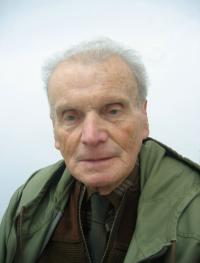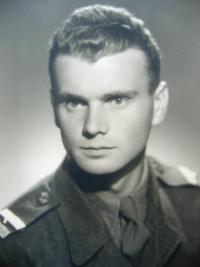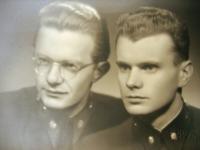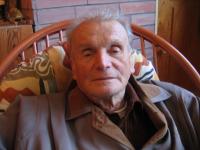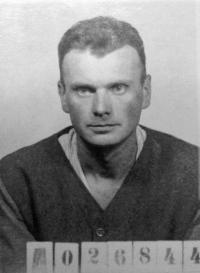“I was supposedly planning to blow up the bridge in Děčín on the 1st of May, when a procession of children would be crossing it.”

Download image
Jan Mečíř was born on the 11th of December 1921 in Stará Paka as the only child of Bedřich and Marie Mečíř. His father worked on the railways his whole life, as a switchman, his mother stayed at home. The family moved to Česká Lípa soon after Jan Mečíř’s birth, where the Czech spirit was slowly rising. Little Jan went to the Czech basic school there, he was one of the best pupils. Thanks to that he was accepted, without entrance exams, to the newly founded Czech State Reformed Grammar School in Česká Lípa, where he reached seventh class. That was in 1938 - the Czech inhabitants were forced to leave the border region, following the signing of the Munich Agreement. The family did not know where to go. In the end they were helped by relatives, and the family moved to Nová Paka, they spent the whole of the war in the nearby Roškopov. As a patriotically minded family, his mother never missed out the celebrations of the founding of Czechoslovakia and the whole family was active in the patriotic Czechoslovak Church, that was a time of great disillusionment. Young Jan Mečíř passed the control exam in latin and was accepted to the grammar school in Nová Paka, where he graduated with honours. Soon after, Jan was drafted into forced labour in the Austrian firm Ernst Heiken Flugzeugwerke Wien-Schwechat. He spent a year in Austria, before a friend from the job centre helped to get him moved to a job in Bohemia. The end of the war meant the re-opening of Czech universities. Jan Mečíř immidiately started his studies at the Faculty of Law of the Charles University in Prague, while retaining his work. He received his degree in 1950, graduating on the 8th of December 1950. After his studies, JUDr. (Doctor of Laws) Jan Mečíř continued to work at the railway as a dispatcher at the Děčín station. Nothing suggested his arrest by the StB (State Security), that would come to pass in just a few years. Until he was moved to Česká Lípa and then arrested by the StB during a meeting of dispatchers on the 7th of September 1954. Mečíř was placed in custody in Litoměřice, and there was he told that he would not be returning home. During the interrogation, several officers took turns trying to force a confession from him. They kept him in irons on all journeys to and from the interrogations for six months. He underwent many interrogations during the night, at the same time he was not allowed to sleep during the day. His trial took place on the 15th and 16th of March 1955, in Litoměřice. Jan Mečíř was, as one of a group of five railway employees, convicted of high treason and espionage and sentenced to 16 years of prison, to the loss of his civil rights for 10 years and was given a life ban from working in transportation. Mečíř spent time in several prisons and labour camps. He was taken from Litoměřice to Pankrác, then to Karlovy Vary, ending up in camp Nikolaj in the Jáchymov district, working the Eduard mine shaft. In June 1956 he succeeded in having his case reviewed, and without the verdict being actually invalidated, he was unexpectedly given freedom on the 20th of December 1956. He managed to get the verdict refuted a month later, on the 20th of January 1957. The other members of the group were also released in time. Seeing as the verdict was invalidated, Jan Mečíř was able to return to his work on the railways, but only as a switchman. In time and with the help of friends he reached the position of dispatcher and head of traffic. His only son was born in 1958, together with his wife they named him aslo Jan. His son successfully studied mechanical engineering and is currently mayor of Stružnice by Česká Lípa. Mečíř’s life after his release was peaceful. In 1960, Mečíř started the building of his own house in Česká Lípa, helped by his parents. He did not neglect his lifetime hobbies, including esperanto, philately and numismatics, hiking and more. As he himself says, he lived a happy life in peace, and he is grateful for that. After 1989 he was called upon by the railway head office, where he worked for several years as a research worker. Jan Mečíř still lives in the house he built in the Sixties. Although he lives on his own, he does not have time to spare. Being the chairman, he takes part in regular meetings of philatelists and numismatics, he is a member of the Česká Lípa branch of the KPV (Confederacy of Political Prisoners) and last but not least, he is still active in his Church, where he has repeatedly held the elected position of vice-chairman of the Council of Elders of the Czechoslovak Hussite Church (Církev československá hustiská). How little free time Jan Mečíř has is easily shown by the fact that he regularly goes to sleep at three or four o’clock at night. Jan Mečíř never forgets to thank his parents and God every morning and evening, that he is able to manage so many activities.
